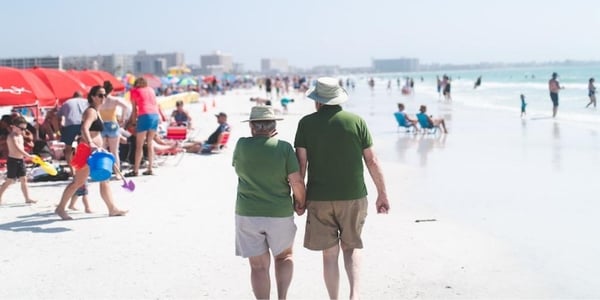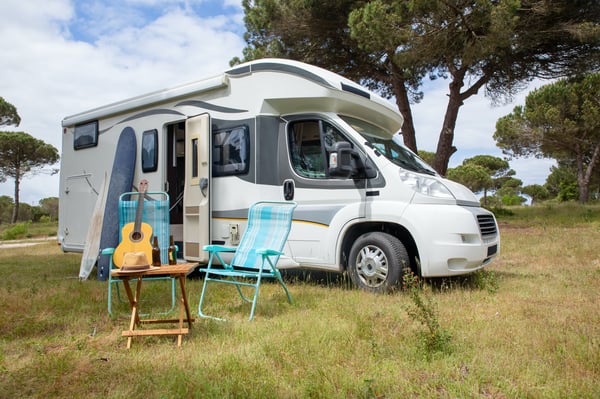Once you clarify why you travel (as discussed in our recent post, Exploring the Reasons To Travel in Retirement), the question now becomes, “Where will I go?”
The following comparisons are in no particular order, but once you’ve decided on one versus the other, then the choice of where to go will come into focus.
Domestic/International
Deciding between a domestic or an international trip often pivots on cost and ease of travel. It’s just easier to travel in your own country where culture, language, currency, and many other attributes are the same as your hometown. Also, since you’re aware of more options for such things as transportation and overnight accommodations, domestic travel will probably cost less.
If the above is true for domestic travel, why would anyone want to take an international trip? For most people, the answer is “because it’s not home.” International travelers seek something different than what’s in their own backyard. There are sights, activities, and cultural attributes that just are not available on a domestic trip. For example, if you want to see the Eiffel Tower, you need to go to France. You also need to be willing to pay the cost of getting to France.
That being said, the following table shows a side-by-side comparison of domestic versus international travel:
| |
Domestic |
International |
|
Travel Documents
|
No passport or other travel documents are needed*. |
Usually need a passport along with any required visas. |
|
Cost
|
Generally, less costly. |
Probably more expensive but currency value differences could make some international travel more affordable. |
|
Transportation
|
More transportation options, e.g., driving one’s own vehicle. |
It’s more likely that air travel will be necessary. |
|
Language
|
Common language in most cases. |
There may be language barriers. |
|
Culture
|
Familiar culture. |
Experiencing cultural differences can be both rewarding and stressful. |
|
Places to Visit
|
There are lots of places to visit in one’s own country. |
Different things to experience than at home. |
|
Reservations
|
Making reservations is probably easier since travelers are familiar with their home culture. |
Travelers may feel less confident about making international reservations. |
|
Do-It-Yourself or Use a Travel Agency
|
DIY traveling is more feasible because the home culture is familiar. |
Because of their lack of knowledge, international travelers may be more likely to use a travel agency. |
|
Trip Length
|
The options for shorter trips are more numerous for domestic travel. |
The farther you go, the more time you’ll want to spend there. |
|
Communications
|
Can use existing mobile phone service. |
May need to make special arrangements for mobile phone use. |
|
Electricity
|
No special preparations are needed to use electric devices. |
Often need adapters for electricity. |
|
Planning
|
Need less planning since travelers perceive domestic trips are less risky. |
Need to plan more thoroughly to account for contingencies arising from different cultures and longer distances traveled. |
|
Healthcare
|
Possibly less disease risk and more access to acceptable healthcare service. |
Possibly more disease risk, and healthcare service in some countries is lower quality and less available than at home. |
|
Stress
|
Domestic trips tend to be less stressful since travelers are more familiar with the culture. |
International trips can cause stress due to cultural differences and long distances traveled. |
*During COVID, proof of vaccination was required in many cases.
Of course, there are nuances to the above comparisons. For example, U.S. citizens traveling to Canada will find fewer differences from home compared to a trip from the U.S. to Japan. Nevertheless, deciding on domestic versus international travel depends on how much cost and stress you’re willing to endure to have the experiences you seek.
Urban/Rural
Travel often is motivated by a desire to get away from the familiar by visiting a different kind of location. If you’re a dweller of a hectic urban landscape, then escaping to the tranquility of the country might be your objective. Conversely, rural residents may seek out the fast-paced excitement of big-city life.
Some travelers may want to experience a variety of locations. An example might be a European river cruise. The ship sails on the river through quiet country areas but docks at major cities so passengers can enjoy all that these urban centers have to offer.
Land/Water
Are you thinking of a trip on land or on the water? As for land experiences, the variety is endless, so let’s focus on water. The quintessential water voyage is a cruise. Large cruise ships today are floating resorts with an array of entertainment and other pleasures. Most make calls at ports where passengers can add land-based excursions.
As an alternative to their wildly popular large cousins, the number of smaller-scale cruise opportunities has been increasing. These generally are ships that carry less than 1,000 passengers, but most are well below that capacity. This type of cruise appeals to people who prefer less on-board congestion and the ability of the ship to dock at more varied ports of call. For example, river cruises have boomed in popularity. Also, some smaller vessels are equipped for more adventurous voyages, such as Antarctica.
For an even closer-to-the-water experience, some travelers charter sailboats. These trips can be with a hired crew, or there is often a “bare-boat” option for those who have maritime credentials to captain a vessel. These trips lack the posh amenities of a big cruise ship but can provide a satisfying hands-on experience for once-in-while sailors.
Warm/Cold
Are you seeking a getaway to another climate? Cold weather motivates some to plan a retreat to warm-temperature destinations while others flock to winter sports meccas for skiing or even ice-fishing. Summer heat inspires some to seek cooler geographies. As climate change pushes summer temperatures to new records in some regions, traveling to beat the heat is liable to increase.
Resort/Tour
Suppose you’d prefer to avoid a do-it-yourself vacation and opt instead for a more scripted experience of a resort or a tour. The difference between these two can be broadly defined by the amount of activity.
A resort stay may tend to be more sedentary with a lot of relaxation time with loads of food and drink. A popular resort option is an all-inclusive, where everything is included for one price. Travelers need to do their homework before committing to an all-inclusive they’ve never been to. Check the details of what exactly is included and what is extra so you’re not surprised by the additional cost. Also, some all-inclusives cut corners on the quality of food, beverages, and amenities. To avoid disappointment, check out the online reviews so you know what to expect.
On the other hand, a tour suggests movement from place to place. The transportation modes differ among tours depending on how much physical exertion is required. You could choose a luxury coach tour where you merely need to get on and off the bus or opt for something more vigorous like a bike tour.
Find more content like this on our Travel Resources page!
Keep reading! Click here to download the eBook, 55+ Travel: The Why, Where, and How!
Related Content:








